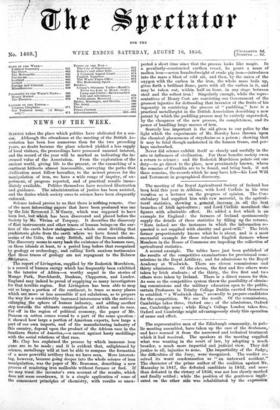NEWS OF THE WEEK.
SCIENCE takes the place which politics have abdicated for a sea- son. Although the attendance at the meeting of the British As- sociation has been less numerous than for the two preceding years, no doubt because the place selected yielded a less supply of local visitors, the proceedings have possessed unusual interest, and the record of the year will be marked as indicating the in- creased value of the Association. From the exploration of the ancient world, giving life to the present, or the ransacking of a continent hitherto almost inaccessible, surveying the paths that civilization must follow hereafter, to the newest process for the manipulation of iron, we have a wide range of inquiry, of ex- periment, of progress reported, and of practical results imme- diately available. Polities themselves have received illustration and guidance. The administration of justice has been assisted, and the duties which society owes to science have been eloquently enforced.
Science indeed proves to us that there is nothing remote. One of the most interesting papers that have been produced was one by the late Reverend J. M'Enery, which was supposed to have been lost, but which has been discovered and placed before the Society by Mr. Vivian of Torquay. It describes the discovery of flint instruments and other traces of human beings on the sur- face of the earth below stalagmite—a whole crust dividing that prrehistoric globe from the earth where we have found the re- mains of the Celts, the early British, and the Roman colonists. The discovery seems to carry back the existence of the human race, on these islands at least, to a period long- before that recognized b geology or archaeology, and calling-forth. anxious testimonies
t these traces of geology are not repugnant to the Hebrew Xriptnres.
The report of Livingston, supplied by Sir Roderick Murchison is a record Of human energy which has frequently been exhibited in the interior of Africa—a worthy sequel to the stories of Mungo Park, Burckhardt, Denham, Clapperton, and Lander. • England may indeed be proud of supplying so many investigators for that terrible region. But Livingston has been able to map out so large a portion of the continent, fo trace so many places which are more or less accessible if not salubrious, as to prepare the way for a considerably increased intercourse with the natives ; enlarging the sphere of human industry, and adding another step towards the ultimate emancipation of Africa and its race. Far of in the region of political economy, the paper of Mr. Denson on cotton comes round to a part of the same question : it showed how large a portion of American exports, how large a part of our own imports, and of the manufacturing industry of this country, depend upon the product of the African race in the Southern States of America,—a caveat against hasty meddlings with the social relations of that race.
Mr. Clay has explained the process by which immense iron guns are to be made ; and it is evident that, enlightened by science, metallurgy will at last be able to compass the formation of a more powerful artillery than we have seen. More interest- ing, however, because going deeper into the whole science of iron manipulation, was the paper of Mr. Bessemer, describing a new process of rendering iron malleable without grnace or fueL If we may trust the inventor's own account of the results, which does not seem overdrawn, it is a simple application of some of the commonest principles of chemistry, with results so unex-
peeted a short time since that the process looks like magic. In a peculiarly-constructed earthen vessel, he pours a mass of molten iron—seven hundredweight of crude pig iron—introduces into the mass a blast of cold air, and then, by the union of the oxygen with the carbon in the iron, the whole mass boils up, gives forth a brilliant flame, parts with all the carbon in it, and may be taken out, within half an hour, in any stage between steel and the softest iron ! Singularly enough, while the repre- sentatives of Henry Cort are convicting our Government of the grossest injustice for defrauding that inventor of the fruits of his ingenuity in contriving the process of " puddling," here is a practical metallurgist in the British Association describing a new patent by which the puddling process may be entirely superseded, by the cheapness of the new process, its completeness, and its power of handling large masses of iron.
Scarcely less important is the aid given to our police by the light which the experiments of Mr. Horsley have thrown upon the chemical phwnomena of strychnine as a poison ; showing that it may be fatal though undetected in the human frame, and per- haps unabsorbed.
Never did science exhibit itself so closely and usefully in the arts or influences of civilization. For these benefits society owes, a return to science ; and Sir Roderick Murchison points out one duty—to go direct to the place, now proximately known, where the remains of Franklin are to be found, and bring back, if not those remains, the records which he may have left—his Last Will and Testament in geographical discovery.


























